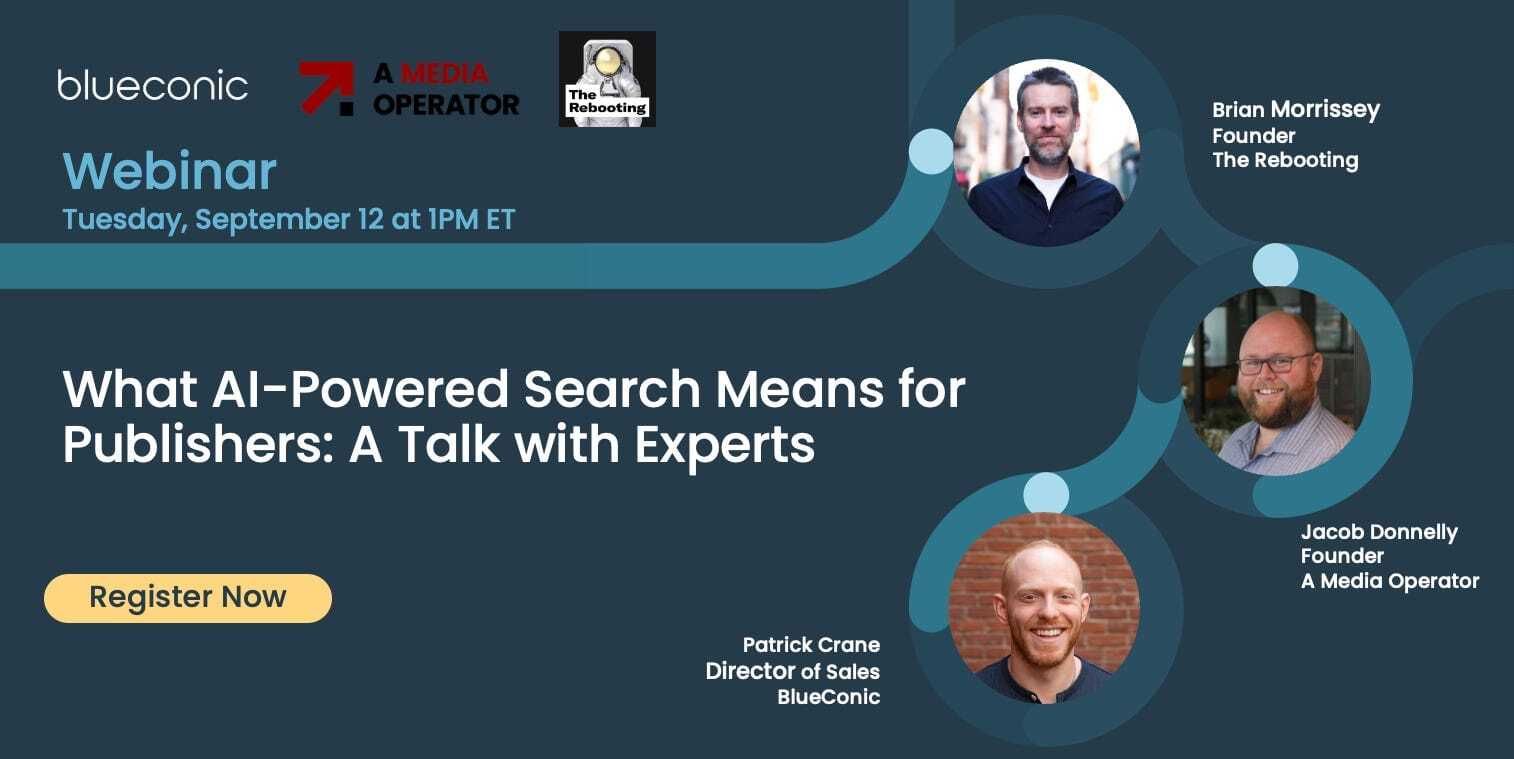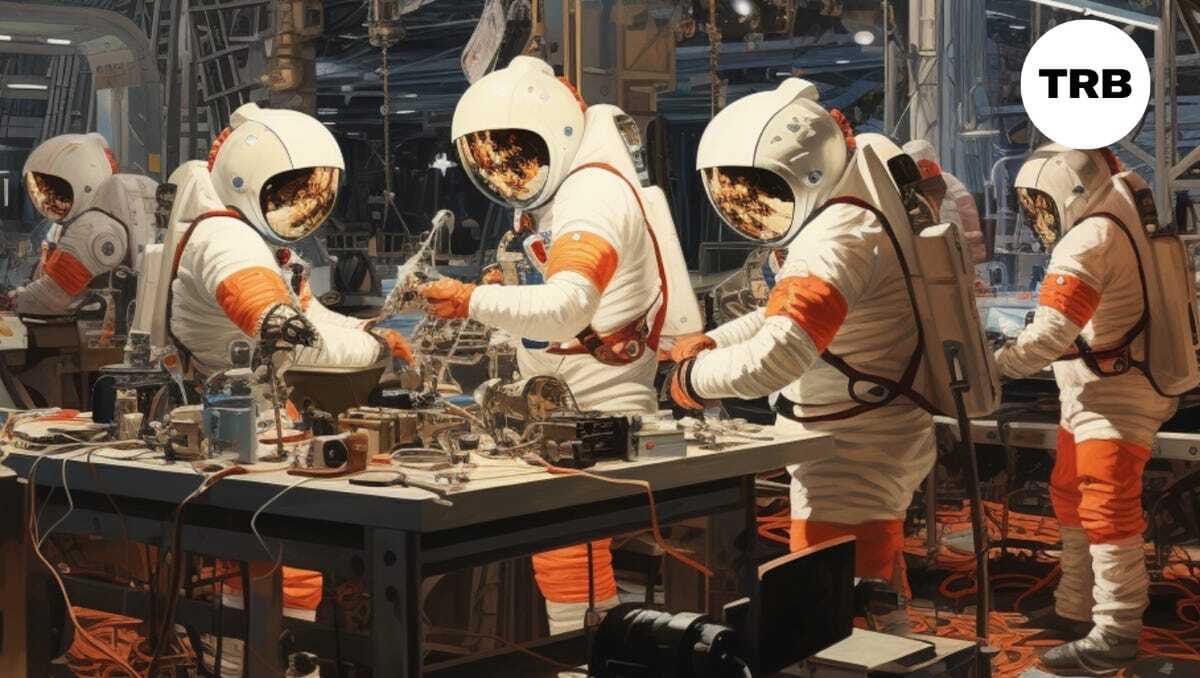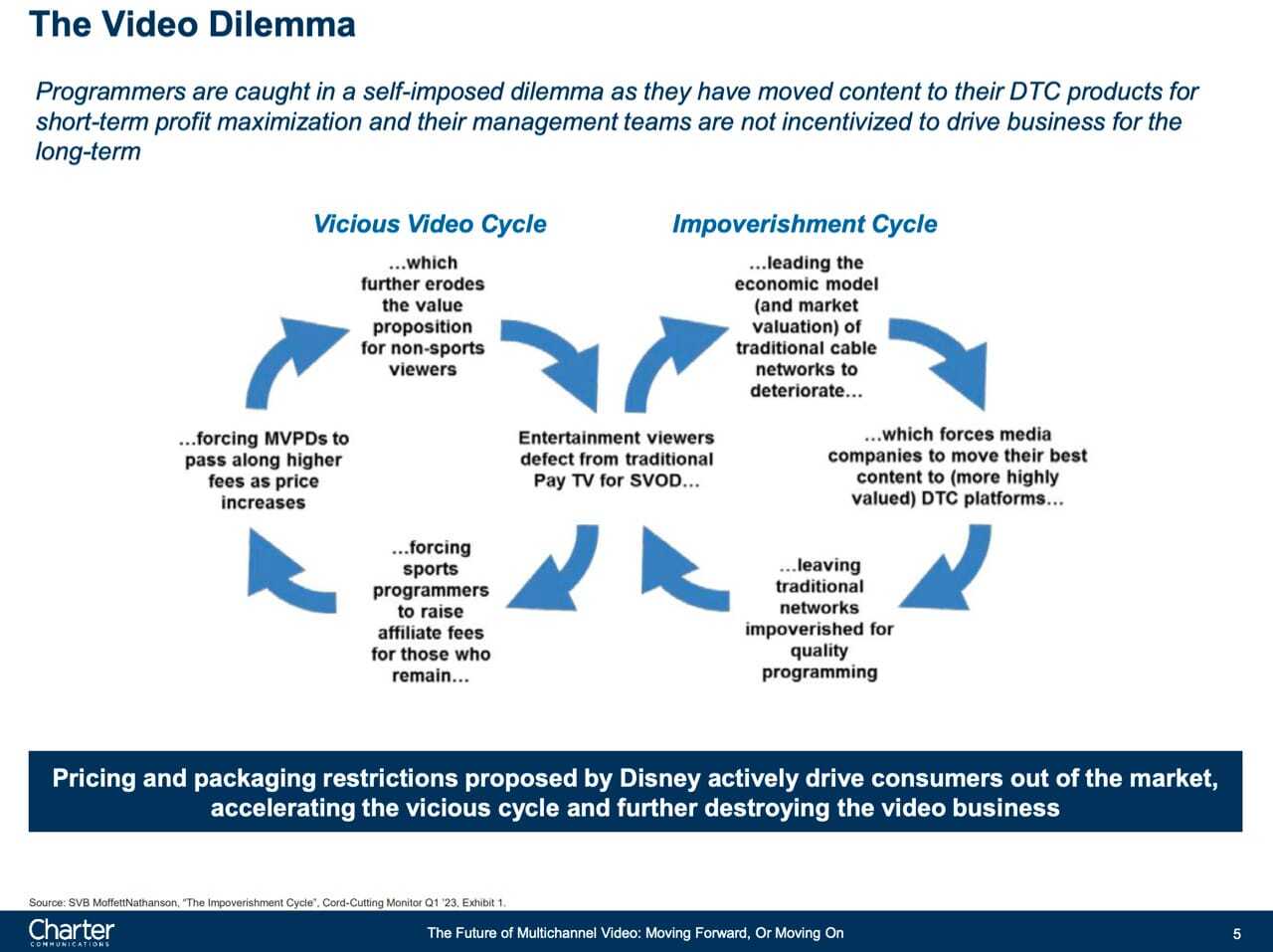
This week, I’m trying something new by making the top of the newsletter an expanded Recommendations section, followed by more feedback on the role of data in building editorial brands. I’m going to keep trying new formats to mix it up.
First up, a message from BlueConic, which is hosting a webinar tomorrow that you should join.


AI-powered search is set to transform the way content is discovered and consumed. This will have serious implications for publishers who are already under pressure to transform their businesses in the wake of cookie deprecation and platform infighting.
Tomorrow (Tuesday, 9/12), I’m joining Jacob Donnelly from A Media Operator and Patrick Crane from BlueConic, to discuss the implications of generative AI changing what I consider the nerve system of digital publishing. Some topics we’ll address:
How AI-driven search will change the way publishers create and monetize content
The intersection between AI-driven search and cookie deprecation preparedness efforts
What publishers can do to future-proof their businesses
Scenes from the rebundling

During a panel at Hubspot’s Inbound conference on Friday, The Hustle head of content Brad Wolverton did a word association game. I got ESPN. My response: “Future HBR case study.” Ben Thompson has the outlines finished already, with his breakdown on how ESPN’s leverage has eroded. Over the last decade the story of cable TV’s decline as a whole has been the slow but steady disintegration of that flywheel, culminating in the current standoff between Charter and Disney,” he writes.
This is a broadly understood story, yet it’s extensible to the entire cable TV ecosystem. The loss of dual revenue streams, or drastic decrease in carriage fees, will mean new economics, as TV is rebundled for the streaming era. Yesterday, I watched the Eagles game through YouTube, and on Thursday I’ll watch them on Amazon. It’s hard to see how tech companies will not exert the same distribution leverage they have in publishing. And publishers can tell the cable guys something: The economics get far worse when you’re the bundled vs the bundler.

The Wall Street Journal see the standoff as cable’s “last stand.” What’s remarkable is how unsurprising all of this is. ESPN executives waved off cord cutting for years. I remember listening to Peter Kafka in 2016 push ex-ESPN honcho John Skipper on this and thinking, Wow, they’re really doing to just jazz hands their way through this. Skipper kept repeating that 100 million people still paid for TV, and ESPN reached 90 million of those households. Since that interview, the number of households has shrunk by about 40%.

The situation Disney finds itself in with ESPN and other TV assets is reminiscent of the old saying about how people go bankrupt: slowly, then all at once. Back when the pandemic hit, Bob Iger was riding into the sunset and trial-ballooning a run for president. He’s now back in the trenches.
Puck’s Dylan Byers’ coverage of Iger’s dilemma. (Disclaimer: I’m trying a deal with Puck where we see if TRB can drive subscriptions. All that aside, Dylan has been a must-read on the inside strory here.)
“This is more than the usual eleventh-hour posturing (though it is also posturing, to be sure). Charter, the nation’s second-biggest cable operator after Comcast, is publicly acknowledging that the cable bundle model that has sustained the media business for decades—minting tens of billions of dollars in annual revenues for the likes of Disney, NBCU, Warner, et al., and fat paychecks for their C.E.O.s—is totally broken. More importantly, Charter is declaring that it is effectively indifferent to a future without its pay TV business. And it is doing all of this just as the American football season—the last bulwark against legacy television’s decline—is getting underway. (ESPN holds rights to Monday Night Football and myriad college football games.) ‘It’s hard to describe the stress right now on the system,’ one veteran media executive said.”
Those stressors are being felt across the media ecosystem, a point I made during the session at Inbound. One of the helpful visions for the media ecosystem is the leveling of the playing field of individuals to compete with far larger organizations that tend to capture more market demand than they arguably deserve. The advantages of scale will further evaporate in a more-with-less era. The 20x developer exists outside of engineering.
The good news for content creators is that making content is so messy that tech companies likely won’t be bothered trying to take the business. Look at Spotify’s disastrous foray into original content with its big-money moves to create its own podcasts. This has been a money pit – Spotify has spent $1 billion for minimal returns – and a source of headaches thanks to Joe Rogan”just asking questions.” Media is hard, and that’s about as close as there is to a moat.
Read more
Puck on ESPN (Sponsored)

Partners for subscription revenue growth
Find out why Peter Gray, former vp of optimization at The Wall Street Journal, called House of Kaizen "quite simply the best partner I've ever had.” They collaborate with publishers worldwide to grow subscription revenue through CX optimization.
Thanks to Matt and House of Kaizen for supporting The Rebooting.
Optimism, quantification and Musk’s management
One of my hills to die on is how “optimism” is frequently weaponized in power battles to delegitimize those asking hard questions. There is no doubt a lot of doom and catastrophism around, but too often difficult questions and criticism is painted as pessimism. Sam Harris has an excellent conversation with Deep Mind co-founder Mustafa Suleyman who believes this won’t do with the far-reaching potential impacts from AI (come to our webinar about this):
“We have to be focused on those downsides and not be afraid to talk about them. When I bring up these topics over the years, there’s this pessimism aversion, people who are constitutionally unable to have a dark conversation about how things may go wrong. I’ll get accused of not being an optimist like that’s some kind of a sun. Or being a pessimist or optimist is a good way of framing things. Both are biased. I’m just observing the facts as I see them.”
Read Rory Sutherland on the dangers of trying to quantify everything and have no other goal that optimizing away inefficiencies: “Like many cost-cutting decisions practiced by our techno-economic lizard overlords, wholesale automation also overlooks the less quantifiable value created by human presence: social exchange, security or reassurance.”
The problem is not the application of data – nobody is going to argue you shouldn’t use available data to improve delivery – but it’s where the application of data comes in the process. Optimization is terrific, only it’s a side dish, not an entree. One veteran editor wrote me to make this point after last week’s piece on “when data misleads.”
“My view was always: You need a distinct and clear content mission and proposition as a starting point – something unique and value-added that also defines your brand – and then, WITHIN that, you need to maximize outreach and use the data to suggest topics, timing of publication and so on. If you fall into Pavolvian response, you distort the content over time and lose that core underlying proposition that brings people in in the first place. I think true engagement is when they are coming to you not for a headline but because you're YOU – and then the trust how you cover almost anything. The whole industry seems to think that there's an invisible audience waiting to discover us if only we improved tactically. Which also creates a mindset that we're always falling short.”
More on Elon Musk’s management techniques are coming out with Walter Isaacson’s book. In a NYT review, Musk’s management approach is laid out. There’s the impatience with blindly following processes as well as an insistence on rapid decisionmaking.
Read more
Please send me a note with your feedback by hitting reply or emailing me at [email protected]
The Rebooting Dinner Series is kicking off in a few weeks with a gathering of top revenue executives from publishers. We have four other dinners lined up in the next few months. Fill out this brief form if you work in areas like product, video, advertising and subscriptions at a publisher, or handle advertising at a marketer or agency.